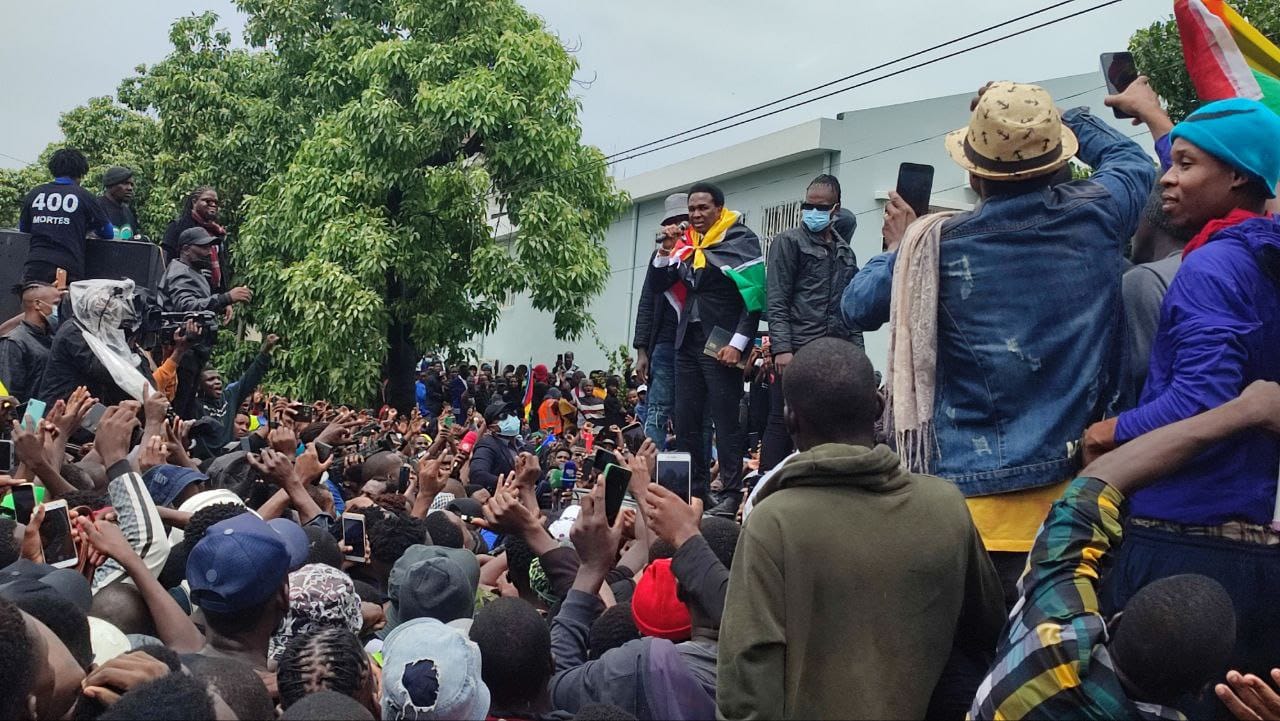Good afternoon. The return of opposition presidential candidate Venâncio Mondlane to Mozambique today has removed any excuse for the government and ruling party Frelimo not to have substantial talks on reaching a political deal with the opposition in order to resolve the dispute over October’s elections. All the opposition parties agree that Mondlane needs to be part of the discussions, and Mondlane said on arrival that he was coming back to show that he was not resisting taking part in talks.
The fact that Mondlane was allowed to land at Maputo airport and receive a police escort which saw him safely into the city (even though police brutality towards his supporters stopped him from addressing the crowds shortly afterwards) strongly suggests that he secured some kind of promise of security and safe passage from the government, despite his claim at the airport that there had been no “political agreement”. The fact that Mondlane chose to come at all indicates that thinks that a deal can be done, although that deal will certainly not involve him becoming president (in spite of Mondlane holding up a Bible and making the empty gesture of reciting the presidential oath at the airport). Mondlane also ruled out being part of any kind of unity government in his remarks on arrival this morning. His appetite for a deal was also signalled by the way he played down talk of a split between himself and Albino Forquilha, leader of opposition party Podemos, which supported him as presidential candidate in the election.
As the opposition candidate who got the most votes in the presidential election (although whether he actually got the most votes, as he insists, cannot be proven) and the instigator of the nationwide demonstrations against the government, Mondlane should be able to get better concessions out of the government than the opposition would have managed without him.
Previously, Mondlane has called for the reform of the electoral authorities and the removal of Frelimo’s influence on state institutions, as well as compensation for the families of people killed by police during the recent demonstrations. One demand of his that he is unlikely to achieve is to get the government to acknowledge that there was large-scale fraud in the elections; at least not enough to change the presidential election outcome.
Previous hopes that a deal could be arrived at by Monday, in time for the swearing-in of members of parliament and in advance of Daniel Chapo’s inauguration as president of Mozambique, have been abandoned, Zitamar News understands. As such, Podemos elected members of parliament will be taking their seats without having obtained any concessions from the government.
Agenda:
- Monday: Swearing-in of members of parliament
- Wednesday: Inauguration of president-elect Daniel Chapo
Today’s headlines:
- Podemos fights for the people and not for Mondlane, says Forquilha (O País, VOA)
- Destruction of ballot papers scheduled for 17 January (Lusa, Lusa)
- Authorities close rice processing plant in Gaza (O País)
- Indian steel giant caught up in legal battle over Revuboè coal concession (Bloomberg)
- At least 18 courts vandalised in protests (Lusa)
- Airlink resumes Nampula flights following assurances over aircraft seizure (Airlink, Airlink)
Podemos fights for the people and not for Mondlane, says Forquilha (O País, VOA)
Albino Forquilha, the leader of opposition party Podemos, yesterday reiterated that the party’s members of parliament would attend the swearing-in ceremony on Monday, despite the party rejecting the official election results. Forquilha said that his party was fighting for the people and not for presidential candidate Venâncio Mondlane, whom it had supported. Speaking at a press conference, he added that the decision did not violate the agreement with Mondlane and did not amount to betrayal of Mondlane. He was responding to Mondlane’s adviser Dinis Tivane, who said it would be a “betrayal” if the Podemos members took their seats. “We have to work to ensure aspects of state reform, so that the next elections can take place with another framework”, Forquilha went on, noting that Mozambican elections had always been disputed, and that Mondlane himself had taken a seat in parliament despite this.







